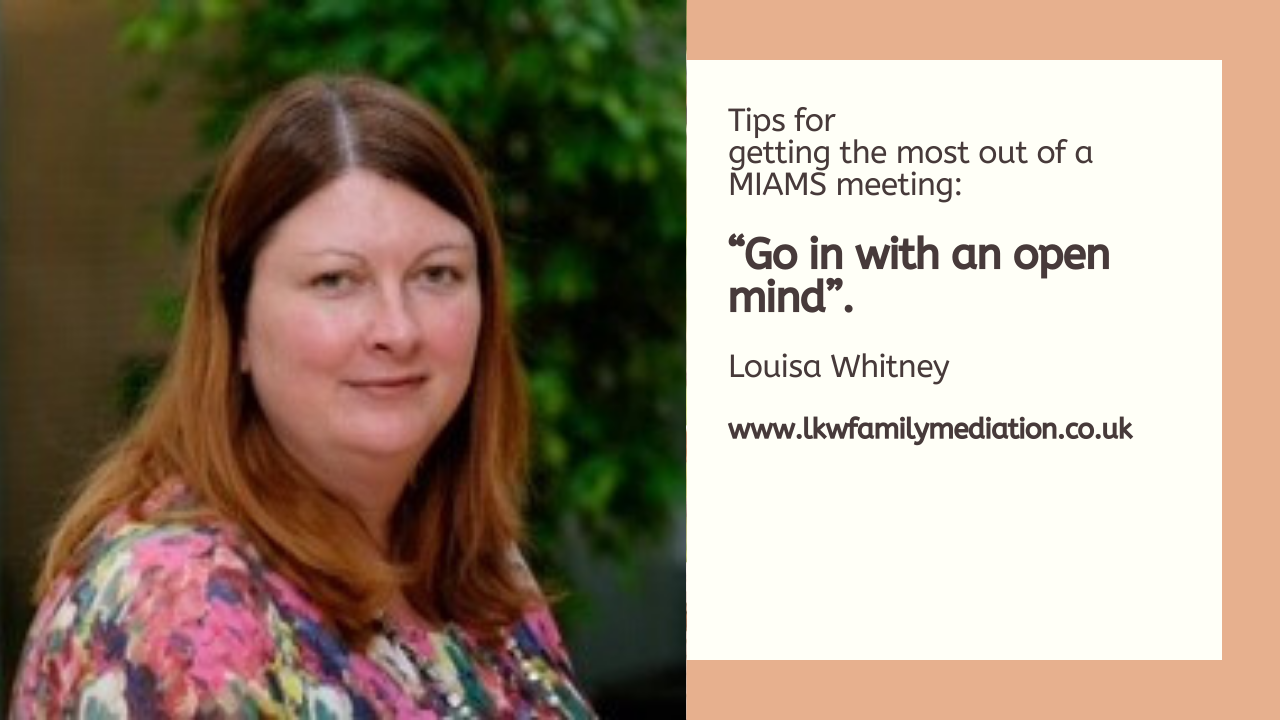In a new series of that will coincide with Family Mediation week we’re giving some top tips. We really do know that those going through a separation struggle to process lots of information when they are feeling emotional and so breaking things down to a simple top 5 tips can be helpful.
In this blog we’re sharing our top 5 tips for getting the most out of a MIAMS. If you’ve already instructed a lawyer then they may have suggested that you attend an initial meeting with a mediator to see whether mediation might help you to find a way forward. Or you may have been instructing a lawyer for some time and they may have suggested you attend a MIAMS because you are required to do so before commencing a court application. Whatever your situation it can be helpful to know how to make the best use of this meeting.
1. Go in with an open mind.Lots of people go into an initial meeting with a mediator having already made up their mind whether mediation is for them or not. Or they may have decided there is no way their ex partner will engage in the process. People can be surprised! A mediator may be able to alleviate concerns you have about the mediation process and this might make you feel differently about things. If your ex partner has not been co-operating with the lawyer instructed by you then they may respond differently to an impartial mediator approaching them. Be open to things unfolding differently to how you envisaged. You could be pleasantly surprised.
2. If you’re struggling to remember things or process information then please know that this is an extremely common side effect of a separation. Being under pressure and going through a grieving process can mean that you are in ‘fight or flight’ mode so you’re not able to access your full brain functioning processes. This can affect your ability to remember, take in, or process information. The mediator should be alive to this. Ask them if they have leaflets that summarise important information, or if they can direct you to online resources for a later date. It can also be helpful to take a friend or family member with you who can take notes. Whilst it would be unusual (but not impossible) to have another person present during joint mediation meetings, initial (MIAMS) meetings will take place separate from the other person so it is fine to have a supportive friend present. Just let the mediator know beforehand so they can ensure they have sufficient chairs and cups available!

3. It’s OK to be emotional at the meeting! Even for clients who have been separated for a period of time it can still bring up emotions going over what happened. Mediators are used to clients being triggered by talking about aspects of their separation (and especially their children) and will respond empathetically and give you time to take a moment if you need to.
4. Don’t be surprised if the mediator seeks to focus you on the future. It’s helpful for the mediator to understand what has happened during the breakdown of your relationship and especially to be told about issues or concerns that you have. But they won’t need the entire history of your relationship and once they have background information from you they will want to look at what happens next, and what you’re looking to resolve and sort out. A mediator’s job in joint meetings is to focus you on the future and what happens next, because you can’t change the past, and they start this focus early on in the mediation process.
5. Ask questions! If there is anything you’re not sure about, concerned about, or curious about then ask the mediator. If you feel the mediator hasn’t properly understood something, then ask them again. It’s important you feel you can work with the mediator and any misunderstandings or worries are best ironed out as soon as possible.
If you’d like more guidance on any aspect of separation then you can visit our online shop.
Other blogs you may find useful:
Our top 5 tips to get the most out of family mediation
If you’d like tips and support to help you manage your post separation arrangements as constructively and peacefully as possible, then why not sign up to our free mailing list and get them direct to your inbox? You’ll get loads of tips along the way and we tend to only send an email a couple of times a month.
We also have a separate list for for professionals working with separating couples. This includes resources for professionals to share with their clients and details of our forthcoming training workshops and networking events.
If you’re a fan of social media then why not follow us there to get more of the things we share. If you feel able to share our posts so we can help more people then we’d be really grateful. You can find us on Facebook, Twitter, Youtube or Pinterest. You can also find Louisa Whitney on Linkedin or Instagram.

